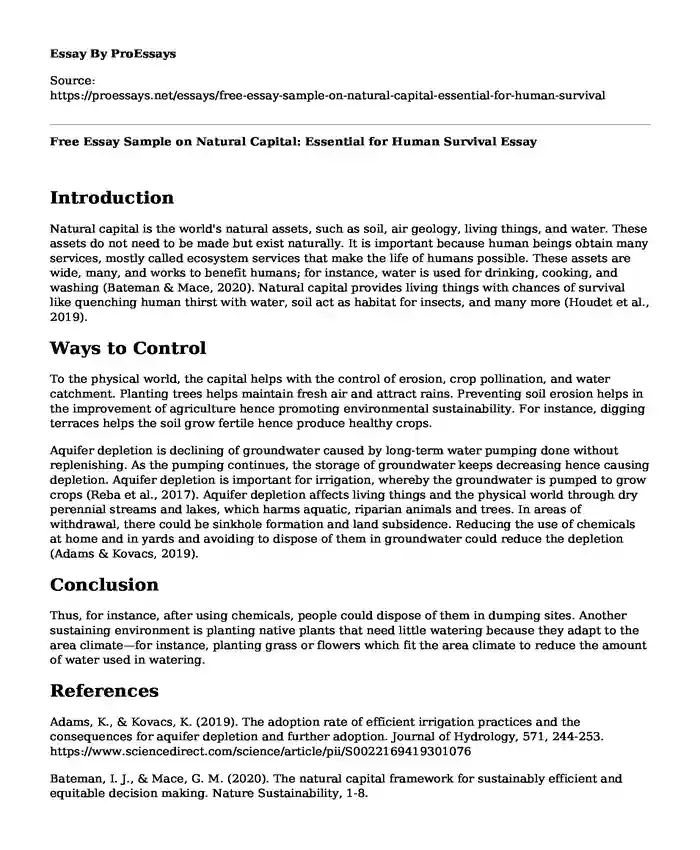Introduction
Natural capital is the world's natural assets, such as soil, air geology, living things, and water. These assets do not need to be made but exist naturally. It is important because human beings obtain many services, mostly called ecosystem services that make the life of humans possible. These assets are wide, many, and works to benefit humans; for instance, water is used for drinking, cooking, and washing (Bateman & Mace, 2020). Natural capital provides living things with chances of survival like quenching human thirst with water, soil act as habitat for insects, and many more (Houdet et al., 2019).
Ways to Control
To the physical world, the capital helps with the control of erosion, crop pollination, and water catchment. Planting trees helps maintain fresh air and attract rains. Preventing soil erosion helps in the improvement of agriculture hence promoting environmental sustainability. For instance, digging terraces helps the soil grow fertile hence produce healthy crops.
Aquifer depletion is declining of groundwater caused by long-term water pumping done without replenishing. As the pumping continues, the storage of groundwater keeps decreasing hence causing depletion. Aquifer depletion is important for irrigation, whereby the groundwater is pumped to grow crops (Reba et al., 2017). Aquifer depletion affects living things and the physical world through dry perennial streams and lakes, which harms aquatic, riparian animals and trees. In areas of withdrawal, there could be sinkhole formation and land subsidence. Reducing the use of chemicals at home and in yards and avoiding to dispose of them in groundwater could reduce the depletion (Adams & Kovacs, 2019).
Conclusion
Thus, for instance, after using chemicals, people could dispose of them in dumping sites. Another sustaining environment is planting native plants that need little watering because they adapt to the area climate—for instance, planting grass or flowers which fit the area climate to reduce the amount of water used in watering.
References
Adams, K., & Kovacs, K. (2019). The adoption rate of efficient irrigation practices and the consequences for aquifer depletion and further adoption. Journal of Hydrology, 571, 244-253. https://www.sciencedirect.com/science/article/pii/S0022169419301076
Bateman, I. J., & Mace, G. M. (2020). The natural capital framework for sustainably efficient and equitable decision making. Nature Sustainability, 1-8.
https://www.nature.com/articles/s41893-020-0552-3
Houdet, J., Browne, M., & Lewis, F. (2019). Tourism and Natural Capital: Inter-Dependencies Between Tourism, the Economy, and Ecosystem Services in South Africa. Environmental Impacts of Tourism in Developing Nations (pp. 280-294). IGI Global.
https://www.igi-global.com/chapter/tourism-and-natural-capital/211536
Reba, M. L., Massey, J. H., AdvientoBorbe, M. A., Leslie, D., Yaeger, M. A., Anders, M., & Farris, J. (2017). Aquifer depletion in the lower Mississippi River Basin: Challenges and solutions. Journal of Contemporary Water Research & Education, 162(1), 128-139.
https://onlinelibrary.wiley.com/doi/abs/10.1111/j.1936-704X.2017.03264.x.
Cite this page
Free Essay Sample on Natural Capital: Essential for Human Survival. (2023, Nov 16). Retrieved from https://proessays.net/essays/free-essay-sample-on-natural-capital-essential-for-human-survival
If you are the original author of this essay and no longer wish to have it published on the ProEssays website, please click below to request its removal:
- The Supply and Use of Water in Abu Dhabi Paper Example
- "Passion for This Earth" Book Review Paper Example
- Environmental Issues Essay Example
- Paper Example on Biodiversity and Ecology Foundations
- Urinary and Reproductive Systems Essay
- Essay Example on Deep Water Horizon Disaster: The Deadly Oil Spill of 2010
- Essay Example on the Next Decade: Human Augmentation & Global Challenges







